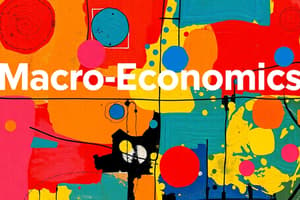Podcast
Questions and Answers
What type of unemployment arises when workers are temporarily out of work while transitioning between jobs?
What type of unemployment arises when workers are temporarily out of work while transitioning between jobs?
- Cyclical unemployment
- Structural unemployment
- Seasonal unemployment
- Frictional unemployment (correct)
What is a primary objective of macroeconomics?
What is a primary objective of macroeconomics?
- Achieving sustained economic growth (correct)
- Increasing consumer demand
- Promoting market competition
- Maximizing individual firm profits
Which of the following is a tool used in monetary policy to manage the supply of money?
Which of the following is a tool used in monetary policy to manage the supply of money?
- Tax adjustments
- Government spending
- Interest rate adjustments (correct)
- Creating trade barriers
Which of the following is a characteristic of microeconomics?
Which of the following is a characteristic of microeconomics?
How does fiscal policy primarily influence the economy?
How does fiscal policy primarily influence the economy?
Which theory explains why countries benefit from specializing in the production of certain goods?
Which theory explains why countries benefit from specializing in the production of certain goods?
How do planned economies typically control price determination?
How do planned economies typically control price determination?
What can high unemployment rates potentially lead to in a society?
What can high unemployment rates potentially lead to in a society?
What factors are commonly associated with sustaining economic growth?
What factors are commonly associated with sustaining economic growth?
What is the primary effect of high inflation on an economy?
What is the primary effect of high inflation on an economy?
Which of the following is NOT a focus of strategies for economic development?
Which of the following is NOT a focus of strategies for economic development?
Which of the following external factors can influence the interaction of supply and demand in a market?
Which of the following external factors can influence the interaction of supply and demand in a market?
Which statement about elasticity of demand is true?
Which statement about elasticity of demand is true?
What is the main goal of a central bank when implementing monetary policy?
What is the main goal of a central bank when implementing monetary policy?
What is a mixed economy characterized by?
What is a mixed economy characterized by?
Which index is commonly used to measure inflation?
Which index is commonly used to measure inflation?
Flashcards
Macroeconomics
Macroeconomics
The study of the overall economy, including inflation, unemployment, and growth.
Microeconomics
Microeconomics
The study of individual economic agents (consumers & firms) and their decisions in markets.
Economic Growth
Economic Growth
The increase in an economy's output or income over time.
Inflation
Inflation
Signup and view all the flashcards
Economic Systems
Economic Systems
Signup and view all the flashcards
Market Economies
Market Economies
Signup and view all the flashcards
Key Macro Objectives
Key Macro Objectives
Signup and view all the flashcards
Supply & Demand
Supply & Demand
Signup and view all the flashcards
Unemployment
Unemployment
Signup and view all the flashcards
Fiscal Policy
Fiscal Policy
Signup and view all the flashcards
Monetary Policy
Monetary Policy
Signup and view all the flashcards
International Trade
International Trade
Signup and view all the flashcards
Economic Development
Economic Development
Signup and view all the flashcards
Supply and Demand
Supply and Demand
Signup and view all the flashcards
Comparative Advantage
Comparative Advantage
Signup and view all the flashcards
Market Equilibrium
Market Equilibrium
Signup and view all the flashcards
Study Notes
Macroeconomics
- Macroeconomics studies the behavior of the economy as a whole, focusing on aggregate measures like inflation, unemployment, and economic growth.
- It examines factors influencing these aggregates, such as government policies, consumer spending, and investment decisions.
- Key macroeconomic objectives generally include sustained economic growth, low unemployment, stable prices (low inflation), and a favorable balance of payments.
- Macroeconomic models are used to understand and predict economic fluctuations.
Microeconomics
- Microeconomics examines the behavior of individual economic agents like consumers and firms.
- It focuses on how they make decisions in markets: what to buy, how much to produce, and at what price.
- Principles of supply and demand are fundamental to understanding microeconomic interactions and equilibrium.
- Concepts like elasticity of demand and supply demonstrate how responsive quantities are to price changes.
- Externalities, market failures, and public goods are considered as departures from the ideal model of perfect competition.
Economic Systems
- Different economic systems (e.g., capitalist, socialist, mixed economies) organize production and distribution of goods and services in unique ways.
- They differ in their ownership of resources, decision-making processes, and mechanisms for price determination.
- Market economies rely on supply and demand forces, while planned economies are centrally controlled.
- Mixed economies combine elements of both market and planned mechanisms.
Economic Growth
- Economic growth refers to an increase in the real output or income of an economy over time.
- Factors impacting economic growth include technological advancements, increase in labor force, improvement in human capital, and increases in capital accumulation.
- Government policies can also influence economic growth—ex: investments in infrastructure, education, and research.
- Sustainable economic growth is a key goal, considering environmental impact and equitable distribution of benefits.
Inflation
- Inflation is the general rise in the prices of goods and services over a period.
- Inflation is measured by various indices such as the Consumer Price Index (CPI).
- High inflation can erode purchasing power and create economic instability.
- Central banks often use monetary policy tools to regulate inflation.
Unemployment
- Unemployment is a measure of the labor force that is actively seeking employment but unable to find it.
- Types of unemployment include frictional, structural, and cyclical unemployment.
- High unemployment rates can lead to social and economic problems like poverty and reduced productivity.
- Various government policies and economic factors can influence unemployment rates.
Fiscal Policy
- Fiscal policy refers to government actions concerning taxation and spending.
- Government spending can stimulate aggregate demand and economic activity.
- Taxes and government borrowing affect individuals' and businesses' incentives for spending and investment.
- Fiscal policy is often used in combination with monetary policy to manage the economy.
Monetary Policy
- Monetary policy refers to actions taken by a central bank to manage the supply of money and credit.
- Key tools include interest rate adjustments and open market operations (buying or selling government securities).
- Monetary policy is used to control inflation, influence economic growth, and stabilize the financial system.
- Central banks aim to achieve price stability and full employment through the use of monetary policy.
International Trade
- International trade involves the exchange of goods and services across national borders.
- Comparative advantage theory explains why countries benefit from specializing in producing and exporting goods they can produce efficiently.
- Trade barriers like tariffs and quotas can limit international trade and potentially harm participating economies.
- International trade can lead to economic growth and increased competition for businesses.
Economic Development
- Economic development encompasses a broader range of factors than economic growth, including improvements in living standards, social indicators, and sustainable practices.
- It typically involves a shift from agricultural-based economies to industrialization and beyond.
- Economic development strategies frequently focus on infrastructure, human capital, and institutions.
- Sustainable development initiatives are increasingly emphasized to ensure both economic and environmental well-being.
Supply and Demand
- Supply and demand are fundamental concepts in economics illustrating the interaction between buyers (demand) and sellers (supply).
- The interplay of supply and demand determines market equilibrium (where quantity supplied equals quantity demanded).
- External factors like government regulations and technological advancements can influence both supply and demand curves.
- Changes in supply and demand create shifts and alter equilibrium price and quantity.
Studying That Suits You
Use AI to generate personalized quizzes and flashcards to suit your learning preferences.




